犬儒主义(英文版)
[指南]犬儒主义
![[指南]犬儒主义](https://img.taocdn.com/s3/m/61083472e55c3b3567ec102de2bd960590c6d9f1.png)
[指南]犬儒主义CynicismThis article is about the current understanding of the word "cynicism". For information on the ancient Greek school of philosophy, see Cynic. For other uses, see Cynic (disambiguation).Cynicism (Greek: Kυνισμ?ς) originally comprised the various philosophies of a group of ancient Greeks called the Cynics, founded by Antisthenes in about the 4th century BC. The Cynics rejected all conventions, whether of religion, manners, housing, dress, or decency, advocating the pursuit of virtue in a simple and unmaterialistic lifestyle.By the 19th century, emphasis on the negative aspects of Cynic philosophy led to a new and very different understanding of cynicism to mean an attitude of jaded negativity, and a general distrust of the integrity or professed motives of other people. Modern cynicism, as a product of mass society, is a distrust toward professed ethical and social values, especially when there are high expectations concerning society, institutions and authorities which are unfulfilled. Cynicism can manifest itself as a result of frustration, disillusionment, and distrust perceived as due to organizations, authorities and other aspects of society, and thus is roughly equivalent to a substantive form of the English word "jaded".History of cynicismThe classical Greek and Roman Cynics regarded virtue as the only necessity for happiness, and saw virtue as entirely sufficient for attaining happiness. Classical Cynics followed this philosophy to the extent of neglecting everything not furthering their perfection ofvirtue and attainment of happiness, thus, the title Cynics, derived from the Greek word κ?ων, ("dog" inEnglish) because they allegedly neglected society, hygiene, family, money, etc, in a manner reminiscent of dogs. They sought to free themselves from conventions; become self-sufficient; and live only in accordance with nature. They rejected any conventional notions of happiness involving money, power, or fame, to lead entirely virtuous, and thus happy, lives.The ancient Cynics rejected conventional social values, and would criticise the types of behaviours, such as greed, which they viewed as causing suffering. Emphasis on this aspect of their teachings led, in the late 18th and early 19th century,to the modern understanding of cynicism as "an attitude of scornful or jaded negativity, especially a general distrust of the integrity or professed motives of others." This modern definition of cynicism is in marked contrast to the ancient philosophy, which emphasized "virtue and moral freedom in liberation from desire."犬儒主义來源於古希臘犬儒學派學者主張的哲學思潮。
【哲学词典】犬儒(Cynics)

【哲学词典】犬儒(Cynics)
犬儒
[源自希腊词kunikos,它是从kuon(意为“狗)转折而来,意为”类似于狗的“]指的是苏格拉底的弟子安提斯泰尼所创建,以西诺班的第欧根尼为代表的希腊学派。
这个学派的得名是因为它反对当时的文明生活,并且反对任何文化约束(规范),而要求我们与自然(physis)一致,像狗一样生活,即从文明生活的观点看,无休无耻地生活。
他们不仅提倡这种苦行主义的生活方式,而且还实际实行它。
不过,犬儒主义不是道德虚无主义。
他们相信德性对于幸福生活是充足的,在于自由地做理性所要求的事情,对欲望和感情的自我主宰,以及对诸如财富、社会地位、愉快和痛苦等外界纷扰的淡漠。
他们认为,”德性“独立于命运和运气。
一种有德行的生活内在地好于无德的生活。
这个观点所寻求的是把人性从社会和历史的背景中独立出来。
动物行为被看作是自然的标准。
它深刻地影响了希腊化时期的圣者的理想,尤其是斯多亚主义的伦理学。
“自从公元前1世纪中叶以来,一个无所不在的人物就是游走性的犬儒,其主要信条是德性的绝对自足。
所有的社会规范、身体安适和命运的馈赠都是微不足道的。
“——朗格和赛德利:《希腊化时期的哲学家》,I,1987年,第3页。
犬儒主义-详解

犬儒主义-详解犬儒主义(Cynicism)目录• 1 什么是犬儒主义• 2 犬儒主义的词源及演变[1]• 3 现代犬儒主义的表现[1]• 4 现代犬儒主义的危害性[1]• 5 现代犬儒主义的典型特征• 6 参考文献什么是犬儒主义犬儒主义是指人们由于对社会总体上或某些具体方面的预期与其实际感受不相匹配,而产生的失望和不满,但对此并不进行积极对抗,甚至会纵容的一种消极态度。
它的一个突出的表现是对一个对象或多个对象的不信任,这种不信任给犬儒主义者的工作、生活和人际交往带来直接或间接的消极影响。
犬儒主义的词源及演变[1]犬儒主义是古希腊的一个哲学流派,这个学派的奠基人叫安提斯泰尼,他主张不要政府、不要私有财产、不要婚姻、不要确定的宗教,但他的这些思想在当时没有产生太大影响。
通常人们公认为安提斯泰尼的弟子——底约基尼斯是犬儒主义学派的创始人底约基尼斯主张清心寡欲。
鄙弃俗世的荣华富贵。
力倡回归自然。
拒绝接受一切的习俗——无论是宗教的、风尚的、服装的、居室的、饮食的、或者礼貌的。
他对“德行”具有一种热烈的感情,他认为和德行比较起来,俗世的财富是无足计较的。
早期的犬儒主义是极其严肃和愤世嫉俗的。
但并不玩世不恭。
如底约基尼斯是一个激烈的社会批评家,他立志要揭穿世间的一切伪善,热烈地追求真正的德行,希望人们从物欲之下真正解放出来。
在公元前三世纪的早期,犬儒学派逐步世俗化.他们认为没有物质财产的生活是最为轻松的生活.但世俗的犬儒主义并不要求人禁绝世俗的好东西,而仅仅是对其表示具有某种程度的漠不关心。
这个时期的犬儒主义者,虽然依然蔑视世俗。
但却失去了蔑视所依据的道德原则。
于是就出现了这样的后果:世间无所谓高尚,也就无所谓下贱。
既然没有什么东西是了不得的,因而也就没有什么东西是要不得的。
他们一方面对世俗观念做出满不在乎的姿态.另一方面又毫无顾忌地去获取他想要获取的任何世俗的东西。
于是愤世嫉俗就变成了玩世不恭,追求真正的德行变成了否认内在的德性与价值。
现代大学生英语 diogenes第欧根尼 戴奥真尼斯 犬儒主义
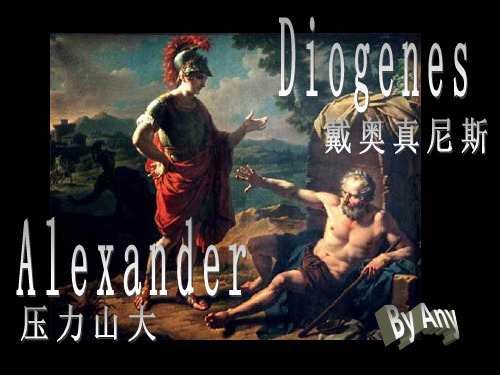
Diogenes------in
Athens
After being exiled, he moved to Athens to debunk拆穿 cultural conventions. Diogenes modeled himself on the example of Hercules. He believed that virtue was better revealed in action than in theory. He used his lifestyle and behavior to criticize the social values and institutions of what he saw as a corrupt society. He declared himself a cosmopolitan四海为家者,世界 主义者.
Diogenes------death
There are conflicting accounts of Diogenes„ death. He is alleged 宣称 variously to have held his breath; to have become ill from eating raw octopus章鱼; or to have suffered an infected dog bite. The Corinthians erected to his memory a pillar on which rested a dog of Parian地名:帕 罗斯marble.
Two years later in 338 BC, Philip gave his son a commanding post among the senior generals as the Macedonian马其顿 army invaded Greece. At the Battle of Chaeronea克罗尼亚 the Greeks were defeated and Alexander displayed his bravery by destroying the elite Greek force. Some ancient historians recorded that the Macedonians won the battle thanks to his bravery.
犬儒主义

• Diogenes walking through Athens in broad daylight carrying a lighted lamp,saying that he was looking for an honest man.
Statue of Diogenes at Sinop, Turkey
Cynicism
陈孟林 1443106000161
Origin of cynicism
• The first Cynic, Antisthenes, gave a speech in the Cynosarges(快犬) gymnasium at Athens. The word Cynosarges means the place of the white dog. • The cynics led a dog-like life.
Antisthenes(安提西尼)
• He is regarded as the founder of Cynicism • A pupil of Socrates. • Lost faith in philosophy in his old ages and gave up the rich life to live in poverty.
A Greek philosopher One of the founders of Cynic philosophy. Diogenes developed Antisthenes's philosphy to the extreme and make it well known.
• He pursued a life of selfsufficiency and shamelessness. • He used his lifestyle and behavior to expound his doctrine:living in a jar,strolling about in full daylight with a lamp,destroying the single wooden bowl he possessed .
关于diogenes英文作文

关于diogenes英文作文英文:Diogenes was a Greek philosopher and one of thefounders of the Cynic philosophy. He was known for his unconventional behavior and his disregard for social norms. One of the most famous stories about Diogenes is when hewas seen carrying a lamp in the daytime, and when askedwhat he was doing, he replied that he was "looking for an honest man."Diogenes believed in living a simple and virtuous life, free from the trappings of wealth and material possessions. He famously lived in a large ceramic jar in the marketplace, and when asked why he did so, he replied, "I am looking for a human being." This shows his disdain for thesuperficiality of society and his desire to live in accordance with nature.I find Diogenes' philosophy to be quite inspiring. Intoday's world, where we are often consumed by the pursuit of wealth and status, his teachings remind us to focus on the things that truly matter. For example, I once found myself caught up in the rat race of corporate life, constantly striving for a bigger paycheck and a higher position. But after learning about Diogenes, I realized that true happiness comes from living a life of virtue and simplicity.中文:底格尼斯是一位希腊哲学家,也是犬儒主义的创始人之一。
犬儒主义
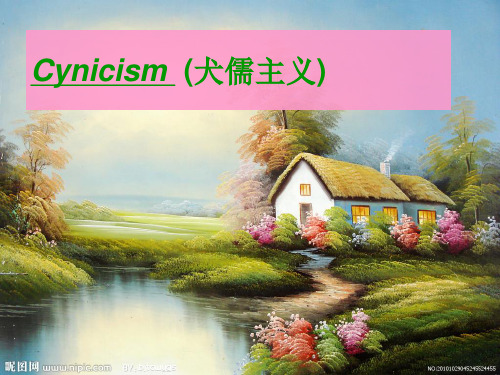
Cynic 犬儒 n.愤世嫉俗者,讽世者;玩世 不恭的人;犬儒主义者 adj. 愤世嫉俗的,犬儒学派的
Now let’s have a look at modern cynicism.
The basic characteristics of modern cynic culture is “say one thing but do quite another”. And cynics believe nothing .They even do not believe that there would be a way to change the Incredible world .So they always treat the world just like treating a joke.
cynicism的常用例句: 1:那就是愤世嫉俗的一种形式。 That is a form of cynicism. 2:"我觉得有太多的怀疑和不容忍,"他说。 "I think there is too much cynicism and too much intolerance”, he sa 3:首先,我们生活在一个愤世嫉俗,玩世不恭的时代。 First of all, we live in an age of cynicism. 4:在一个愤世嫉俗的年代,他们提醒我们作为美国人的我们。 In a time of cynicism, they remind us of who we are as Americans. 5:我想,如何在这个犬儒主义的时代,使人信服? And I said, how, in this age of cynicism can I convince people? 6:我们就有希望;当我们遇到嘲讽和怀疑。
Unit-4-Diogenes-and-Alexander省名师优质课赛课获奖课件市赛课一等奖课件

Achigy, Achilles was aGreek hero of the Trojan War and the central character and greatest warrior of Homer's Iliad. Achilles’ most notable feat during the Trojan War was the slaying(杀戮) of the Trojan hero Hector outside the gates of Troy.Achilles was invulnerable in all of his body except for his heel. Because of his death from a small wound in the heel, the term Achilles‘ heel has come to mean a person’s point of weakness. 阿喀琉斯:荷 马史诗《伊利亚特》中旳英雄
(left) Alexander; (right) Diogenes
Diogenes
Nothing is known about his life, but his surviving Lives and Opinions of Eminent Philosophers (《名哲言行录》)is a principal source for the history of Greek philosophy. He thought that all should live natually, for what is natural is normal and cannot possibly be evil or shameful. Live without conventions, which are artificial and false: escape complexities and extravagances(奢侈): only so can you live a free life.
犬儒主义PPT

Classic Cynicisim
• This philosophy of cynicisim was that the purpose of life was to live a life of Virtue(美德 )in agreement with Nature.
• This meant rejecting all traditional desires for wealth, power, health, and fame, and by living a simple essions。
Diogenes
Cynicisim
Cynicisim
cyn=dog (the origin of the cynic name is doggishness,meaning “dog-like") cyn+ic→cynic n 犬儒主义者 cynic+ism→cynicism n.犬儒主义
refers to the beliefs of an ancient school of Greek philosophers known as the Cynics.
• According to a popular story, Diogenes walked through Athens in broad daylight carrying a lighted lamp, saying that he was looking for an honest man.
Diogens
• a Greek philosopher and one of the founders of Cynic philosophy.
●
●Diogenes developed Antisthenes' philosphy to the extreme and make it well known .
老罗语录-犬儒主义
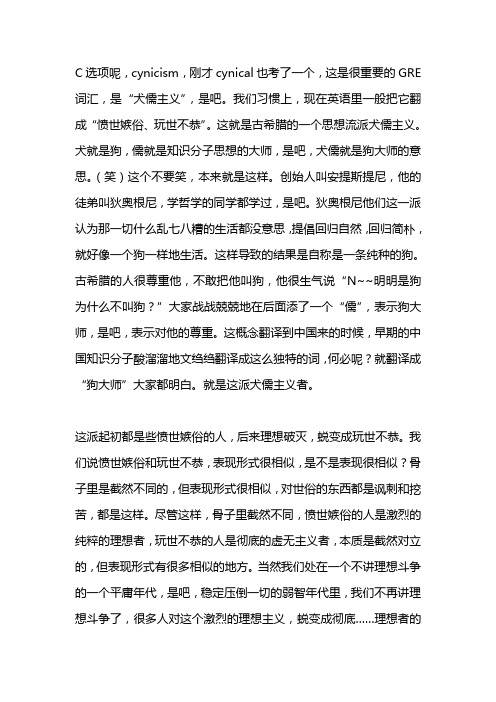
C选项呢,cynicism,刚才cynical也考了一个,这是很重要的GRE 词汇,是“犬儒主义”,是吧。
我们习惯上,现在英语里一般把它翻成“愤世嫉俗、玩世不恭”。
这就是古希腊的一个思想流派犬儒主义。
犬就是狗,儒就是知识分子思想的大师,是吧,犬儒就是狗大师的意思。
(笑)这个不要笑,本来就是这样。
创始人叫安提斯提尼,他的徒弟叫狄奥根尼,学哲学的同学都学过,是吧。
狄奥根尼他们这一派认为那一切什么乱七八糟的生活都没意思,提倡回归自然,回归简朴,就好像一个狗一样地生活。
这样导致的结果是自称是一条纯种的狗。
古希腊的人很尊重他,不敢把他叫狗,他很生气说“N~~明明是狗为什么不叫狗?”大家战战兢兢地在后面添了一个“儒”,表示狗大师,是吧,表示对他的尊重。
这概念翻译到中国来的时候,早期的中国知识分子酸溜溜地文绉绉翻译成这么独特的词,何必呢?就翻译成“狗大师”大家都明白。
就是这派犬儒主义者。
这派起初都是些愤世嫉俗的人,后来理想破灭,蜕变成玩世不恭。
我们说愤世嫉俗和玩世不恭,表现形式很相似,是不是表现很相似?骨子里是截然不同的,但表现形式很相似,对世俗的东西都是讽刺和挖苦,都是这样。
尽管这样,骨子里截然不同,愤世嫉俗的人是激烈的纯粹的理想者,玩世不恭的人是彻底的虚无主义者,本质是截然对立的,但表现形式有很多相似的地方。
当然我们处在一个不讲理想斗争的一个平庸年代,是吧,稳定压倒一切的弱智年代里,我们不再讲理想斗争了,很多人对这个激烈的理想主义,蜕变成彻底……理想者的蜕变已经感到陌生了。
其实我们生活中理想主义者到处都有,好比说我们对人生事业的理想啊,就说生活中普通的理想你总有吧,比如说爱情上的理想主义者。
小伙不错,内在外在都很好,大学四年没谈恋爱,为什么?好多女孩子追他都不答应,为什么?因为他是爱情上的理想主义者,坚信有个女孩等了他五百年之类的,就不谈。
看到,呃这个就是那个,是吧,然后就谈起来,谈得挺高兴,一个星期以后发现这个女孩子同时有七个男朋友。
关于主义的英文单词
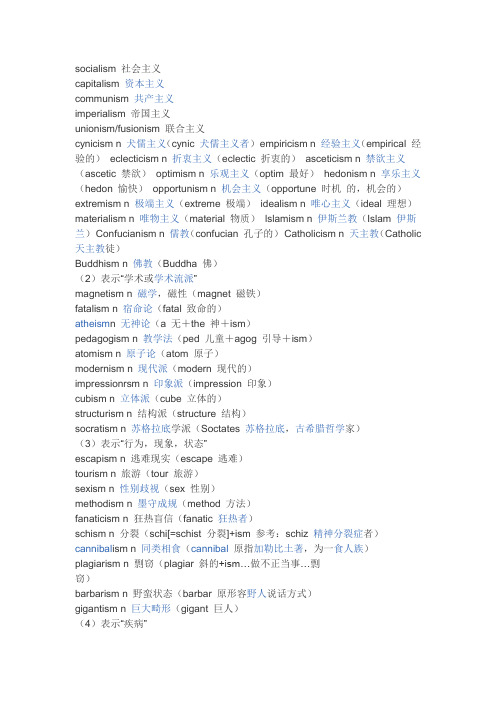
socialism 社会主义capitalism 资本主义communism 共产主义imperialism 帝国主义unionism/fusionism 联合主义cynicism n 犬儒主义(cynic 犬儒主义者)empiricism n 经验主义(empirical 经验的)eclecticism n 折衷主义(eclectic 折衷的)asceticism n 禁欲主义(ascetic 禁欲)optimism n 乐观主义(optim 最好)hedonism n 享乐主义(hedon 愉快)opportunism n 机会主义(opportune 时机的,机会的)extremism n 极端主义(extreme 极端)idealism n 唯心主义(ideal 理想)materialism n 唯物主义(material 物质)lslamism n 伊斯兰教(Islam 伊斯兰)Confucianism n 儒教(confucian 孔子的)Catholicism n 天主教(Catholic 天主教徒)Buddhism n 佛教(Buddha 佛)(2)表示“学术或学术流派”magnetism n 磁学,磁性(magnet 磁铁)fatalism n 宿命论(fatal 致命的)atheism n 无神论(a 无+the 神+ism)pedagogism n 教学法(ped 儿童+agog 引导+ism)atomism n 原子论(atom 原子)modernism n 现代派(modern 现代的)impressionrsm n 印象派(impression 印象)cubism n 立体派(cube 立体的)structurism n 结构派(structure 结构)socratism n 苏格拉底学派(Soctates 苏格拉底,古希腊哲学家)(3)表示“行为,现象,状态”escapism n 逃难现实(escape 逃难)tourism n 旅游(tour 旅游)sexism n 性别歧视(sex 性别)methodism n 墨守成规(method 方法)fanaticism n 狂热盲信(fanatic 狂热者)schism n 分裂(schi[=schist 分裂]+ism 参考:schiz 精神分裂症者)cannibal ism n 同类相食(cannibal原指加勒比土著,为一食人族)plagiarism n 剽窃(plagiar 斜的+ism…做不正当事…剽窃)barbarism n 野蛮状态(barbar 原形容野人说话方式)gigantism n 巨大畸形(gigant 巨人)(4)表示“疾病”astigmatism n 散光(a 无+stigmat 斑点+ism…看不见斑点…散光)daltonism n 先天性色盲(Dalton 道尔顿,研究色盲的英国化学家、物理学家)atavism n 隔代遗传(atav 祖先+ism)rheumatism n 风湿病(rheumat 稀黏液+ism ) alcoholism n 酒精中毒症(alcohol 酒精)albinism n 白化病(albin 白色+ism )(5).表示“具备某种牲质”humanism n 人性(human 人)brutalism n 兽性(brutal 野兽的)antatonism n 对抗性(ant 对抗+agon 打斗,竞赛)absurdism n 荒唐性(absurd 荒唐的+ism)。
The Summary of Diogenes and Alexander

征服者亚历山大和哲学家第欧根尼尽管身份 上天差地别,但他们对于其他人来说扮演的 都是传教士的角色。第欧根尼将他“自然生 活”的哲学理念传遍希腊,而亚历山大则将 整个希腊文明带到了全世界。他们都是站在 人类的高度在思考问题。
“Is there anything I can do for you , Diogenes” Alexander “yes, stand to one side. You are blocking the sunlight” Diogenes 不屑与亚历山大交流,思想高于亚历山大 不分阶级的思想 Diogenes的所作所为都是为了向平民(群众) 表达无所畏惧的犬儒主义者的自由的,忽略权势 和财富 to one side.You’re blocking the sunlight.”
人在世上真正需要的是什么?无非是阳光--阳 光是一个象征,代表自然给予人的基本赠礼, 自然规定的人的基本需要,合乎自然的简朴 生活。谁挡住了阳光?亚历山大--亚历山大也 是一个象征,代表权力、名声、财富等一切 世人所看重而其实并非必需的东西。不要挡 住我的阳光--不要让功利挡住生命,不要让习 俗挡住本性,不要让非必需挡住必需,这就 是犬儒派留给我们的主要的哲学遗训。
“If I were not Alexander,I should be Diogenes.”
第欧根尼拒绝接受一切的习俗——无论是宗 教的、风尚的、服装的、居室的、饮食的、 或者礼貌的。他对“德行”具有一种热烈的 感情,他认为和德行比较起来,俗世的财富 是无足计较的。他追求德行,并追求从欲望 之下解放出来的道德自由
Even with a sharp contrast between the ascetic philosopher and the all-powerful king, the two figures had something in common: their eyes are both on the freedom and happiness of the world. 禁欲主义的哲学家和全能王之间的鲜明对比, 同样追求世界的自由和幸福。
关于犬儒主义的英语作文
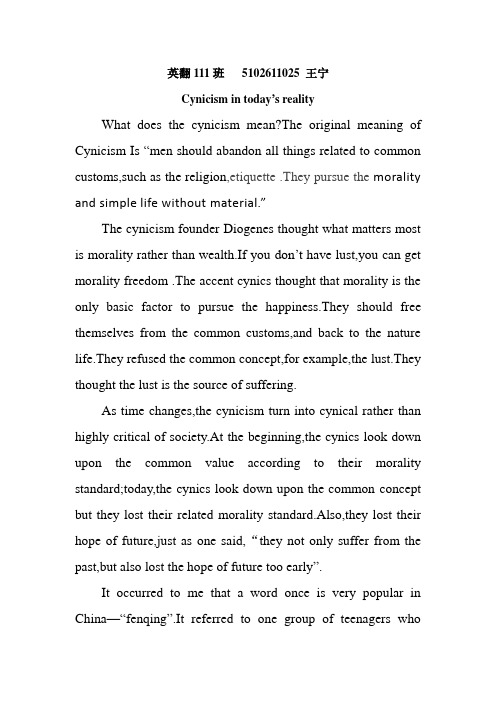
英翻111班5102611025 王宁Cynicism in today’s realityWhat does the cynicism mean?The original meaning of Cynicism Is “men should abandon all things related to common customs,such as the religion,etiquette .They pursue the morality and simple life without material.”The cynicism founder Diogenes thought what matters most is morality rather than wealth.If you don’t have lust,you can get morality freedom .The accent cynics thought that morality is the only basic factor to pursue the happiness.They should free themselves from the common customs,and back to the nature life.They refused the common concept,for example,the lust.They thought the lust is the source of suffering.As time changes,the cynicism turn into cynical rather than highly critical of society.At the beginning,the cynics look down upon the common value according to their morality standard;today,the cynics look down upon the common concept but they lost their related morality standard.Also,they lost their hope of future,just as one said,“they not only suffer from the past,but also lost the hope of future too early”.It occurred to me that a word once is very popular in China—“fenqing”.It referred to one group of teenagers whoshow their dissatisfaction to the society.Even it seems that they have lost the hope to the society ,but in fact they use this way to show their hope of a better future of the society.This is similar to the “woolly-headed” idea in today’s cynicism.“Woolly-headed”doesn’t mean that your head is not clear.It means that one doesn’t think there is anyway can change the world which he doesn’t believe it can be changed.The modern cynics change their dissatisfaction into an acception which they do n’t acknowledge,an understanding which they don’t refuse,a dispassion which they don’t rebel.The cynics pretend to be fool when they have considered it absolutely.It has some practical significance today.Every coin has two sides.Cynicism also has its advantages and disadvantages. Today we should discard the dross and take the essence of cynicism.。
犬儒学派名词解释

犬儒学派名词解释
犬儒学派是古希腊哲学的一个流派,由犬儒主义(Cynicism)所代表。
犬儒主义强调简朴的生活方式,追求真实和自由,并对社会和文化价值观持怀疑态度。
以下是对犬儒学派相关名词的解释及拓展:
1.犬儒主义(Cynicism):这是犬儒学派的核心思想,其名字来源于希腊语"kynikos",意为“犬一样的”。
犬儒主义认为人应当像野生的狗一样生活,过简朴的生活并追求自由和坦诚。
犬儒主义者抗拒社会的规范和传统,将财富、权力和名声视为虚妄。
2.犬儒哲学家(Cynic philosopher):犬儒学派的代表人物为犬儒哲学家,其中最著名的是戈尔基皮当斯(Diogenes of Sinope)。
犬儒哲学家以他们的穷困生活方式和非常态的行为而闻名,如在公共场合裸体或放任自流。
3.斯多噶(Stoic):犬儒学派的一支派别是斯多噶学派,该学派强调自理、克己和对内心的控制。
斯多噶哲学主张追求心灵的平静和智慧,以及心灵的自由,与他们相似之处在于强调简朴和追求真实。
4.犬儒自由(Cynic freedom):犬儒主义者追求的自由与传统的政治自由不同。
犬儒自由强调个体内在的自由,以及追求真实和坦诚的自由。
犬儒主义者认为通过放弃物质欲望和社会规范,可以实现内心的自由。
总的来说,犬儒学派强调简朴的生活、追求真实和自由,对社会规范和文化价值持怀疑态度。
犬儒主义者通过与社会脱离和过简寂的生活方式,追求内心的自由和真实存在。
他们的理念强调了个体内在的力量和自由意志,并对现实世界提出了质疑。
犬儒主义通俗解释

犬儒主义通俗解释什么是犬儒主义?犬儒主义(Cynicism)一词源于古希腊哲学家狄奥根尼斯(Diogenes)所创立的学派,他们以自由、自省和独立为核心价值观。
犬儒主义强调摒弃物质欲望、社会规范和传统价值观,主张简朴生活和自由思考。
犬儒主义者常常被认为是悲观、愤世嫉俗的人,但他们也关注存在的真理和人类的本质。
犬儒主义的起源和发展犬儒主义起源于古希腊,最早由狄奥根尼斯创立。
他以过着简朴生活和摒弃世俗欲望为信条。
狄奥根尼斯被称为“犬儒真正的狗”,他认为社会文化的规范和金钱财富只会让人陷入虚假的幸福之中,真正的幸福在于回归自然本性和追求心灵的自由。
在狄奥根尼斯之后,犬儒主义逐渐演变成一种思想流派,并传播到罗马帝国和中世纪欧洲。
犬儒主义的核心价值观1. 自由和独立犬儒主义者强调个体的自由和独立思考,他们不愿受制于社会的规范和道德准则。
犬儒主义认为个人应该追求内心真实的愿望,而不是被外部压力和期望所束缚。
2. 摒弃物质欲望犬儒主义主张简朴生活,反对追求物质财富和奢侈享受。
他们认为追求物质只会带来短暂的快乐,真正的幸福在于满足基本的需要并寻求精神的满足。
3. 自省和真理犬儒主义者通过自省和反思来寻求真理。
他们认为人类常常被外部世界的干扰所迷惑,通过内心的观察和思考可以更好地理解自己和世界。
4. 反对社会虚伪犬儒主义者愤世嫉俗,他们批评社会上的虚伪、欺骗和功利主义。
犬儒主义主张真实和纯粹的生活,反对人为的社会规范和虚假的道德准则。
犬儒主义的现代意义虽然犬儒主义起源于古代,但它的思想仍然在现代社会中具有重要意义。
1. 追求真实和自由在当今虚假和功利的社会,犬儒主义对于追求真实和自由思考具有启发意义。
人们常常被社会期望所束缚,忽略了自己的真实需求。
犬儒主义者通过坚持真实和追求内心的自由来提醒人们关注自己的需求和愿望。
2. 批判社会虚伪犬儒主义的批判精神对于揭示社会的虚伪和不公具有重要意义。
犬儒主义者通过揭露社会中的欺骗行为和虚假道德准则,鼓励人们以真实和正直的方式面对现实。
犬儒主义英文作文
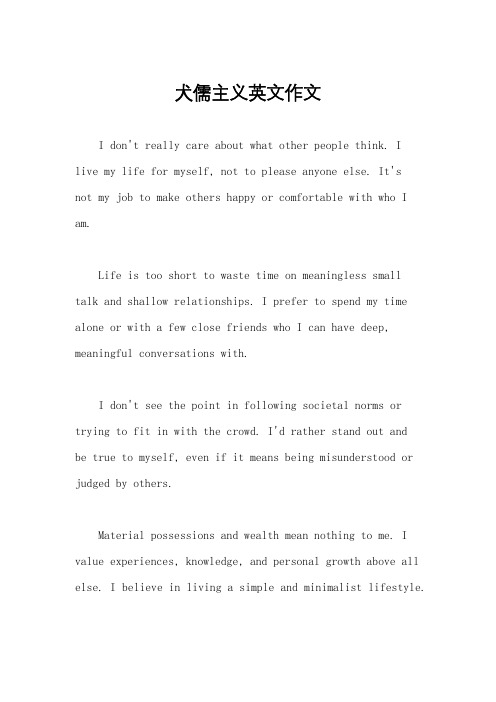
犬儒主义英文作文I don't really care about what other people think. Ilive my life for myself, not to please anyone else. It'snot my job to make others happy or comfortable with who I am.Life is too short to waste time on meaningless smalltalk and shallow relationships. I prefer to spend my time alone or with a few close friends who I can have deep, meaningful conversations with.I don't see the point in following societal norms or trying to fit in with the crowd. I'd rather stand out andbe true to myself, even if it means being misunderstood or judged by others.Material possessions and wealth mean nothing to me. I value experiences, knowledge, and personal growth above all else. I believe in living a simple and minimalist lifestyle.I don't believe in the concept of unconditional love or selflessness. I think it's important to prioritize your own well-being and happiness before anyone else's.I find comfort in the fact that life is ultimately meaningless and that we are all insignificant in the grand scheme of the universe. It takes the pressure off and allows me to live without the burden of expectations or obligations.。
Cynicism (犬儒主义)
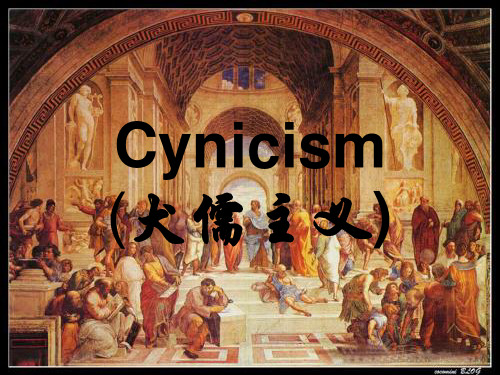
VI. Cynicism and Christianity
Historical Jesus as a Jewish Cynic:
Some historians have noted the similarities between the life and teachings(教义 ) of (教义) Jesus and those of the Cynics. Some scholars have argued that the Q document( the hypothetical common source for the gospels of Matthew and Luke) has strong similarities with the teachings of the Cynics. Other scholars doubt that Jesus was deeply influenced by the Cynics, and see the Jewish prophetic(预言的) tradition as of (预言的) much greater importance.
There are four reasons why the Cynics are so named:
First because of the indifference of their way of life, for they make a cult (狂热崇拜;迷信)of indifference and, like dogs, eat and make love in public, go barefoot, and sleep in tubs and at crossroads. The second reason is that the dog is a shameless animal, and they make a cult of shamelessness, not as being beneath modesty, but as superior to it. The third reason is that the dog is a good guard, and they guard the tenets(宗旨;原则) of their philosophy. The fourth reason is that the dog is a discriminating (有辨别力的)animal which can distinguish between its friends and enemies. So do they recognize as friends those who are suited to philosophy, and receive them kindly, while those unfitted they drive away, like dogs, by barking at them.
- 1、下载文档前请自行甄别文档内容的完整性,平台不提供额外的编辑、内容补充、找答案等附加服务。
- 2、"仅部分预览"的文档,不可在线预览部分如存在完整性等问题,可反馈申请退款(可完整预览的文档不适用该条件!)。
- 3、如文档侵犯您的权益,请联系客服反馈,我们会尽快为您处理(人工客服工作时间:9:00-18:30)。
What’s CynicismCynicism, refers to the beliefs of an ancient school of Greek philosophers known as the Cynics.Their philosophy was that the purpose of life was to live a life of Virtue in agreement with Nature. This meant rejecting all conventional desires for wealth, power, health, and fame, and by living a simple life free from all possessions.People could gain happiness by1.rigorous(严苛的) training2.living in a way which was natural for humans.Suffering was caused by1.false judgments of what was valuable2.the worthless customs and conventions which surrounded society.Many of these thoughts were later absorbed into Stoicism(禁欲主义)3 main cynicsAntisthenesAn older contemporary of Plato1. A disciple(门徒,弟子) of Socrates1.He preached a life of povertyDiogenes of Sinope1.The disciple of Antisthenes (?)1.He embraced the ascetic(禁欲的) way of life1.lifestyle:self-sufficiency ,austerity(苦行), and shamelessnessAsceticism:sleeping in a tubShameless behaviour: eating raw meatBiting satire: "bad people obey their lusts as servants obey their masters"Crates of Thebes others1.The third figure who dominates Cynic history.He is said to have been a pupil of Diogenes (?)2 origins of the Cynic1.In ancient times, the first Cynic Antisthenes, taught in the Cynosarges gymnasium(古希腊运动场)at Athens.2.Cynosarges means the place of the white dog3.Dog was thrown at the Cynics as an insult for their rejection of conventional manners.4.Diogenes, states "other dogs bite their enemies, I bite my friends to save them."4 reasons for why the Cynics are so named1 The indifference of their way of life, like dogs, eat and go barefoot in public.2The dog is a shameless animal, and they make a cult(膜拜,崇拜) of shamelessness3The dog is a good guard, and they guard the tenets(宗旨,原则)of their philosophy4The dog is a discriminating animal which can distinguish between its friends and enemiesFundamental principles1The goal of life is happiness which is to live in agreement with Nature2Happiness depends on being self-sufficient, and a master of mental attitude3Self-sufficiency is achieved by living a life of virtue4The road to virtue is to free oneself fromany influence like wealth, fame, or power5Suffering is caused by false judgments of valueCynicism in the Roman WorldThere is little record of Cynicism in the 2nd or 1st centuries BCE(公元前)By the 1st century CE, Cynicism reappeared with full force.The rise of Imperial Rome may have led to a sense of powerlessness and frustration among many people, which allowed a philosophy which emphasized self-sufficiency and inner-happiness to flourish once again.Cynicism and ChristianitySome scholars have argued that the Q document,the hypothetical(假设的) common source for the gospels(福音)of Matthew(马太)and Luke(路可),has strong similarities with the teachings of the Cynics.Other scholars doubt that Jesus was deeply influenced by the Cynics, and see the Jewish prophetic(预言的) tradition as of much greater importance1.Many of the ascetic (苦行的)practices of Cynicism may have been adopted byearly Christians.1.The ascetic orders of Christianity also had direct connection with the Cynics,and in many of their practices were little different from the Cynics of an earlier agecontemporaryBy the 19th century, emphasis on the negative aspects of Cynic philosophy led to the modern understanding of cynicism to mean——An attitude of scornful negativity, especially a general distrust of the sincerity or goodness of human motives and actionsIt can manifest itself as a result of frustration, disillusionment, and distrust perceived as due to organizations, authorities and other aspects of societySocial Effects of CynicismThe cynicism of Diogenes☐artificial growths of society were incompatible with happiness☐morality implies a return to the simplicity of nature☐"Humans have complicated every simple gift of the gods.“☐"cosmopolitan”☐Scorned family; political social organization; property rights; reputation.The ideal Cynic would evangelise:hound people about the error of their ways (watchdog of humanity)expose the pretensions which lay at the root of everyday conventionsPositive effectsTraditional cynicism is a worthy and even noble world-view -- up to a point.●rare opportunity to live in harmony with your values●freedom from self-deception●immunity against faddish "groupthink"●development of an independent, contrarian mind and spirit●introspect the pursuit of fame and fortuneNegative effects•First, cynicism points to the unintended consequences of actions and derides our belief in our ability to rationally assess those consequences or plan for them.•Second, it attacks the stability of institutions•Third, it recasts valued political conceptsEnsemble effect•Different types of cynicism that interact in an "ensemble effect," composed of master-cynic, insiders, and powerless public.•master-cynic•Insiders•powerless publicModern attitude•First,see it critically•Second,make full use of Positive Cynicism: keep our integrity without being miserable•Reject what you can tolerate,Reward yourself by loving something with a passion.1.the fundamental principles of Cynicism● 1.The goal of life is happiness which is to live in agreement with Nature.● 2.Happiness depends on being self-sufficient, and a master of mental attitude.● 3.The road to virtue is to free oneself from any influence such as wealth, fame, or power,which have no value in Nature.2. History of Cynicism1. Origin of the Cynic name---doggishness•from Ancient Greek κυνικός(kynikos), meaning "dog-like•the first Cynic, Antisthenes, taught in the Cynosarges gymnasium at Athens. The word Cynosarges means the place of the white dog。
